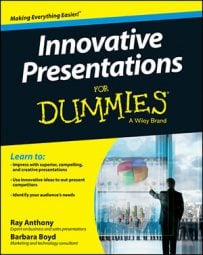Most audiences of innovative presentations ask mild, inquiring yet nonthreatening, questions. Boardroom presentations tend to generate a lot of questions during the presentation rather than afterwards. Nonetheless, questions are an integral part of any presentation, and you need to devote adequate time and effort to do well in this area.
Anticipating, carefully preparing for, and masterfully answering questions is just as — and sometimes even more — important than planning and delivering your core presentation.
The mark of a true professional presenter is not just in how you give a structured presentation, but how you deal with all sorts of challenging questions, concerns, and points of contention from your audience.
Being an interactive presenter who eagerly encourages questions and engages an audience is a decided plus. Dealing with audience concerns by adjusting your presentation on the fly boosts your credibility and professional image.
The questions you’re asked give you important clues about your audience. Take advantage of audience questions to reinforce all your key points and priority information from your talk.
It takes refined communication skill and oftentimes a bit of psychology to become good at answering questions off the cuff. Although you may have prepared for anticipated questions, you’re likely to face a situation that requires you to present in an impromptu or extemporaneous way.
A proven process can help you handle audience comments, queries, and feedback. Your answers are really mini-presentations in themselves and should have a goal, a strategy, and an organized flow of good information.
Handling the occasional tough — even provocative or hostile — question with grace and aplomb is a great chance to strut your stuff. A calm, confident, and composed demeanor in the face of a challenging question makes a mighty big impression with your audience.
Fortunately, you seldom face the verbal firing squad of character-building questions, objections, or other forms of resistance to your ideas, plans, or recommendations. Nevertheless, answering questions and objections effectively — accurately, thoroughly, and competently — and handling trouble-causing members of an audience with poise and grace strengthens your credibility, professionalism, and leadership image while improving the chances of reaching your presentation goals.

